Food must become economically sustainable for the good of all. How do we do this?
We choose not to ignore basic rights to food, water, shelter and energy. As a result we strive to overcome mounting problems, exploring how can we all nourish ourselves whilst nurturing our world.
Do you eat? What a question this is - of course you do!
Do you care about the cost of your food? Again, yes!
Do you also care what profit a farmer is making while toiling over fields to produce ingredients for your food? We hope you do…
As a farmer, or an investor with interests in agro tech, farming or crop yields, would you like to see more profit, actually any profit at all? Again we would assume 100% would say yes, what’s the point if we don’t make a living?
We ask these questions today because there are worrying trends affecting nearly every aspect of our food industry. A stark example is that arable farmers have seen profits fall dramatically more than 50% for the last two years in a row. (see statistics in “read more” at the bottom of this article).
Also, to take you a bit deeper down this fundamental rabbit hole, if you knew how many hectares are farmed in the world and were aware both how many people are predicted to be in the world, and also how many migrants are moving to areas of our planet less effected by turmoil, conflicts and climate, would you say it’s better to just be mono cropping fields which produce one yield per year with shrinking profit margins due to costs, or is it better to increase yields deploying biodiverse and multi cropping in a higher percentage of our fields to produce more healthy nutritious foods, greater yields and better profits?
It is hard to have a finite opinion on “the Way of Food” because certain farming works in certain areas of the world, as each crop and food source grows best in certain conditions. Certainly it is hard to argue a case against mono cropping in the highest percentage of of our fields because of our massive global demand for the two largest crops, corn and wheat, especially when giving their fields time to rotate, breathe and gather more nutrients. We are fans too of urban farming, vertical farming and hydroponics. What we do have opinion on is a future reliance of too much irrigated water, as well as our championing of permaculture and organic foods not needing purchased fertilizers or sprays.
We also know, as we have been involved for the last twenty years in providing food to the very poor and people caught up in wars and crisis around the world, that in the epicenters of chaotic territories we can not ask the question to a starving soul “are you gluten, grain or dairy free?” Corn and wheat are a life-giving vital need for a vast majority. Today there is catastrophic famine and hunger. In the last few days care givers in one country, Mozambique, told our Food4Africa team in South Africa that they are giving out 300,000 meals a day in the northern territories as Isis led insurgencies increase. In this case we can help but we could be handing out tens of millions of porridge meals every day to people in need around the world if we were able.
Yet there is concerning and growing evidence that the food industry that we have taken for granted to provide for our every meal is increasingly fragile, just when we need it to be strong.
At our kitchen tables, and in our lives today we are much more interested in asking the questions to our forums than settling on the answers given through time that have us where we are, and what we are increasingly experiencing as a collective today within this age of our humanity.
Today we have our own opinions, as you will, based on how we have personally experienced many aspects of the food chain, and how we continue to explore certain avenues to test outcomes which are affecting our own lives and many around us. We also stretch into casting visions for our future as well as activating initiatives to counter the cause and effect of centuries old circumstances.
How do we choose to answer this call?
You may know or admire Daniella and I as well as our teams for Sanara hotels or Real Coconut Kitchens, however our highest calling, our greatest challenge today is answering this call, the cries of our precious planet and all of humanity that look to live on this earth. We do not choose to ignore the basic needs of food, water, shelter and energy for all, and as result we continue to question ‘giving and receiving” solutions to how can we all nourish ourselves whilst nurturing our world.
If we are to open more hotels or residences and host you in our kitchen, it won’t be just to give you more memorable moments or experience a sustainable way of living. It will also be, as it has been for the last ten years, to discuss and actively collaborate with many of you on how we respond and charter a planetary, as well as personal course to health, peace and authentic prosperity.
Time is essential now. Food problems mount every month with farmers across North America and Europe increasingly struggling to make a livelihood. Arable farmers are facing 50% less profit this year than they were last year, which was also a lot less than the year before. They also see the effects of climate crisis with both arid and flooding consequences. Farmers face costs spiraling. Seeds, fertilizers, sprays, energy and transportation. Everywhere they look prices are spiralling. It’s daunting to any one we speak to. Government subsidies are also drying up.
Then once food is produced, we are confronted by the dangerous consequence of supply chain issues based on wars and threats to shipping lanes and border crossings, yet all the time there are more mouths to feed. China is stockpiling. India has an embargo on exports and hunger expands every day; Africa which historically has received nearly all food imports into most of its countries without exporting is only now recognizing its potential to feed itself as a.continent and export to you.
Global production areas of flour became a major part of our food business as we increased our orders into the millions of dollars from countries like Indonesia, the Philippines, Sri Lanka, Nigeria and Costa Rica. We had to deal with the cost trends of shipping containers six weeks on the water as well as all the vagaries of moving food around the world to your table.
In the restaurant industry, owners are choosing to close up rather than make losses. We closed three despite their immense popularity. So many of your favorite food brands in stores are either shrinking, compromising on ingredients or putting their prices up. We got to 4,000 stores with tortillas, burritos, chips and cookies in markets like Whole Foods and testing good numbers in Costco, as well as selling our tortillas as own label to restaurants and a growing supermarket chain. We championed low impact healthy ingredients like coconut, cassava, plantain and jackfruit but we could not get to making profit. Today larger supermarkets are also preferring to put more and more own label brands on their shelves than supporting local providers.
Yet despite of all of these issue we see so many possibilities for the future. We also at the deepest level know the importance of food production ethics, environmental practices and healthy ingredients. It’s here we can interact with you to help regenerate this vital basic right for the sake of all.
The issue is not the issue, it is how we choose to respond to the issue which is THE issue.
What is Multi-Cropping?
Multiple cropping, defined as harvesting a field more than once a year, is a widespread land management strategy in tropical and subtropical agriculture. It is a way of intensifying agricultural production and diversifying the crop mix for economic and environmental benefits.
Taking it a couple of steps further…
Currently Daniella Hunter and her husband Charlie Stuart Gay empower and pioneer multi crop and regenerative farming initiatives in Liberia, a country where they have a long history of supporting. Through their Foundation they funded an incubator for Africa, Hope Farm, in association with the great African humanitarian Dr. Kimmie Weeks.
Daniella and Charlie empower colleagues like Kimmie to learn organic composting, low impact water engineering and planting up to 20 different crops in the same field.
Firstly there is no tilling of the lands. Physically tilling crushes the soil structure, making soil more likely to erode and less likely to absorb water efficiently. On the biological side, the action of tilling kills many of the organisms that live in the soil.
Instead we use the roots of the larger crops like plantain trees and cassava bushes to both open up the soil as well as provide a shade canopy from the heat of the day.
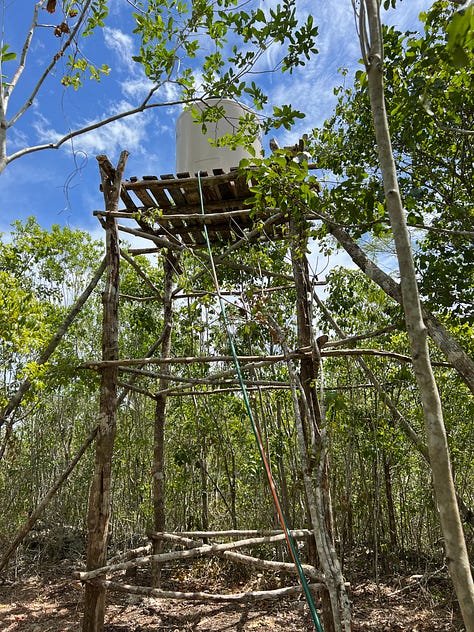

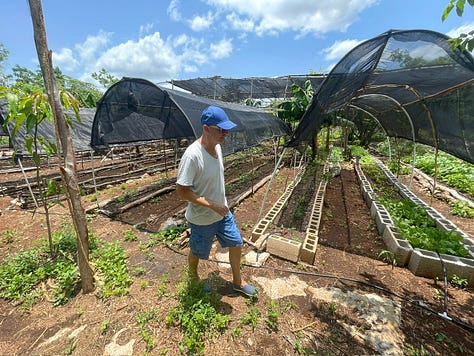

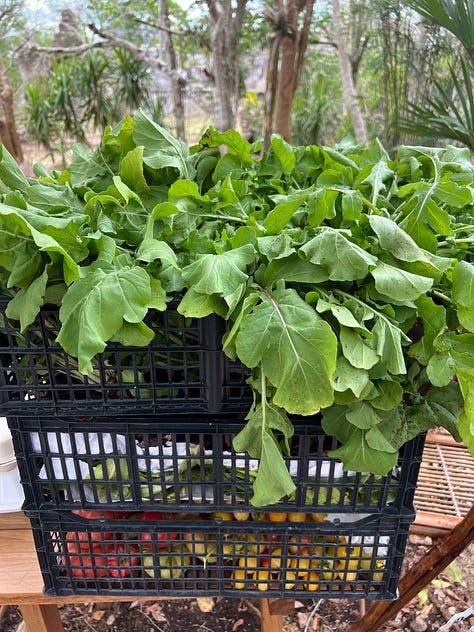
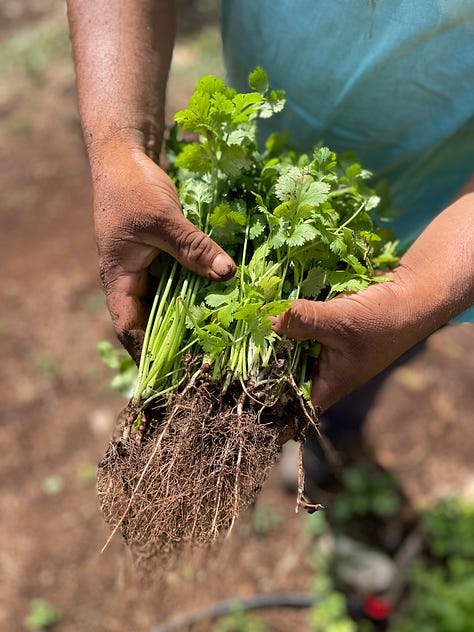
Then we cultivate any kitchen crop that the climate can produce, such as beans, peppers, onions, spring onions, carrots, all types of lettuces and tomatoes, sweet potato, fennel, cilantro, ginger root, mint, chives, amaranth and others.
Kimmie’s Story
One day in 2020 during Covid lock down Kimmie had called Daniella and Charlie in Tulum and asked whether their next support could help to counter Liberia’s rice imports of over USD $100 million a year (they also were importing $50 million in out of date frozen chicken and $50 million of fish scraps from China, and exporting nothing). Daniella said with alarm “No Kimmie, we understand the need for rice in Africa but with all its water needs it could be an environmental disaster to grow in Liberia, and it would cost tens of millions to set up”. Kimmie also asked for a tilling machine on a tractor and Daniella immediately said “please no”. BUT she did also say…
‘Kimmie, Watch the Netflix documentary, Kiss The Ground and then call us back’
Kimmie watched the movie and immediately got back on a call with a newfound fervour and impetus to look at how best to steward and farm both the land of Hope Farm, then to share his learning, and then to take this out further afield to neighbouring countries. A few months later he came to Malibu to learn organic composting techniques from Kerry, the owner of the Malibu Fig Ranch and then he ate Daniella’s meals from the Real Coconut Kitchen menu in Malibu. Kimmie was dumbfounded as he ate delicious organic meals made from the crops that are sold on the side of road stalls across Liberia. He was eating dishes made from plantain, coconut, cassava, jackfruit and breadfruit. He had never realized the sustainable economic model that could lift his country….. but that day Kimmie woke to a new possibility for Liberia and for Africa, and Daniella and Charlie knew that the idea was in good hands. Kimmie had founded the child disarmament brigade at thirteen during hellish wars, was the National Orator at twenty four under the first ever female Present of an African nation, who later appointed him chairman of water and sewage during Ebola. Charlie and Daniella had also worked on multiple successful initiatives with him

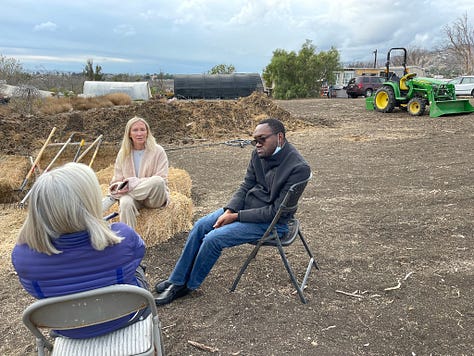

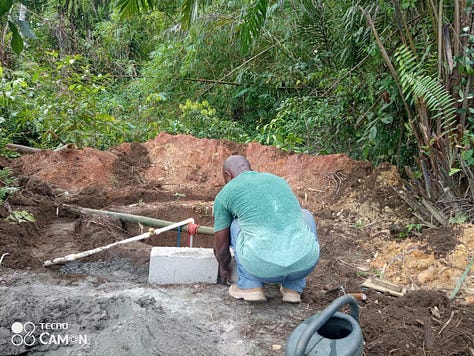



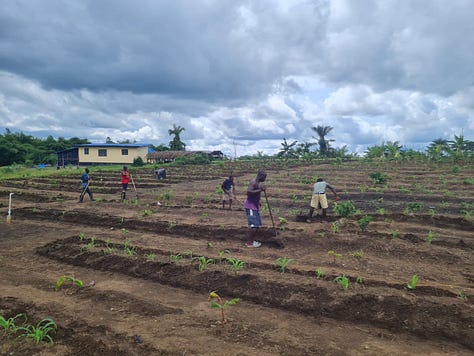

Kimmie returned to Liberia and empowered those around him and with Daniella and Charlie’s support Hope Farm was birthed. Today the incubator project is producing abundant produce and Kimmie is expanding the project a hundred fold in size, ready to empower local farmers to follow his lead.
Your Opportunity
As we detailed in our opening paragraphs we are much more interested in posing relevant questions, stimulating curiosity within ourselves and our Fellowship. We are not content right now to settle on the answers being given to us all.
We will also run this topic as an open chat forum in Substack.
Below to stimulate your own questions we provide some current research from qualified sources. The numbers tell their story.
Read More
This story map showcases research published in the Global Environmental Change journal:

Global Environmental ChangeVolume 64, September 2020 looked at the ratios of how we farm our global fields. This is their opinion:
Here we present the first global gridded data set of multiple cropping systems and quantify the physical area of more than 200 systems, the global multiple cropping area and the potential for increasing cropping intensity. We use national and sub-national data on monthly crop-specific growing areas for 26 crop groups, global cropland extent and crop harvested areas to identify sequential cropping systems of two or three crops with non-overlapping growing seasons. We find multiple cropping systems on 135 million hectares (12% of global cropland) with 85 million hectares in irrigated agriculture. 34%, 13% and 10% of the rice, wheat and maize area, respectively are under multiple cropping, demonstrating the importance of such cropping systems for cereal production. Harvesting currently single cropped areas a second time could increase global harvested areas by 87-395 million hectares, which is about 45% lower than previous estimates. Some scenarios of intensification indicate that it could be enough land to avoid expanding physical cropland into other land uses but attainable intensification will depend on the local context and the crop yields attainable in the second cycle and its related environmental costs.
The Current Outlook of Wheat in 2024
These are the worrying farming statistics and current trends that have us motivated and challenged.
USA.
Net farm income, a broad measure of profits, is forecast at $116.1 billion in calendar year 2024, a decrease of $39.8 billion (25.5 percent) relative to 2023 in nominal (not adjusted for inflation) dollars. This follows a forecast decrease of $29.7 billion (16.0 percent) from 2022 to $155.9 billion in 2023.
UK.
The rollercoaster for UK arable farmers looks set to continue, with growers enduring more than a 50% drop in profits for harvest 2023, due to the impact of lower commodity prices, higher working capital requirements and the drop in Basic Payments Scheme (BPS) receipts.
Crop yield: 3.75 tonnes per acre
Wheat price: £150
Production output: £563
BPS: £82. Government subsidies scheme ( taken away in the UKzat the end of 2023 with a reduced scheme decreasing payments 2024-2027 )
Total Revenue: £645
Variables
Seed: £90
Fert: £220
Sprays: £90
VC Total: £400
Fixed costs £100
Gross profit: £145
These are rough estimates and they give you an idea of how you would be feeling if you were an arable farmer.
Add a rent of £120, and bank charges of £10, and welcome to farming.
If you want to join our What’s App Fellowship community please scan the QR code below.
Thank you.

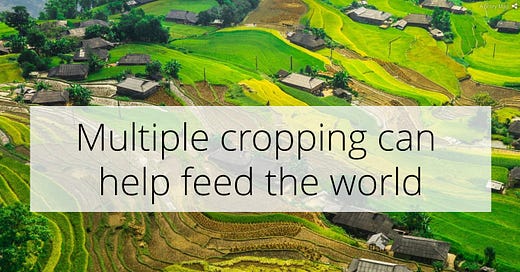


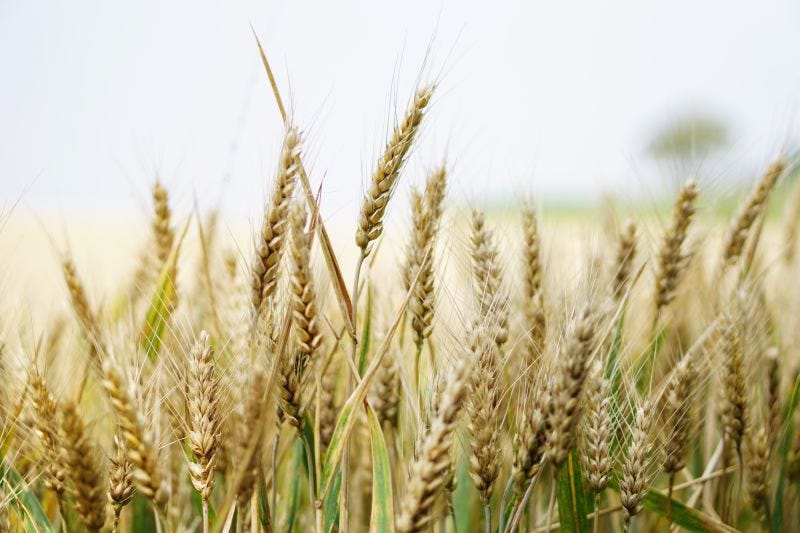
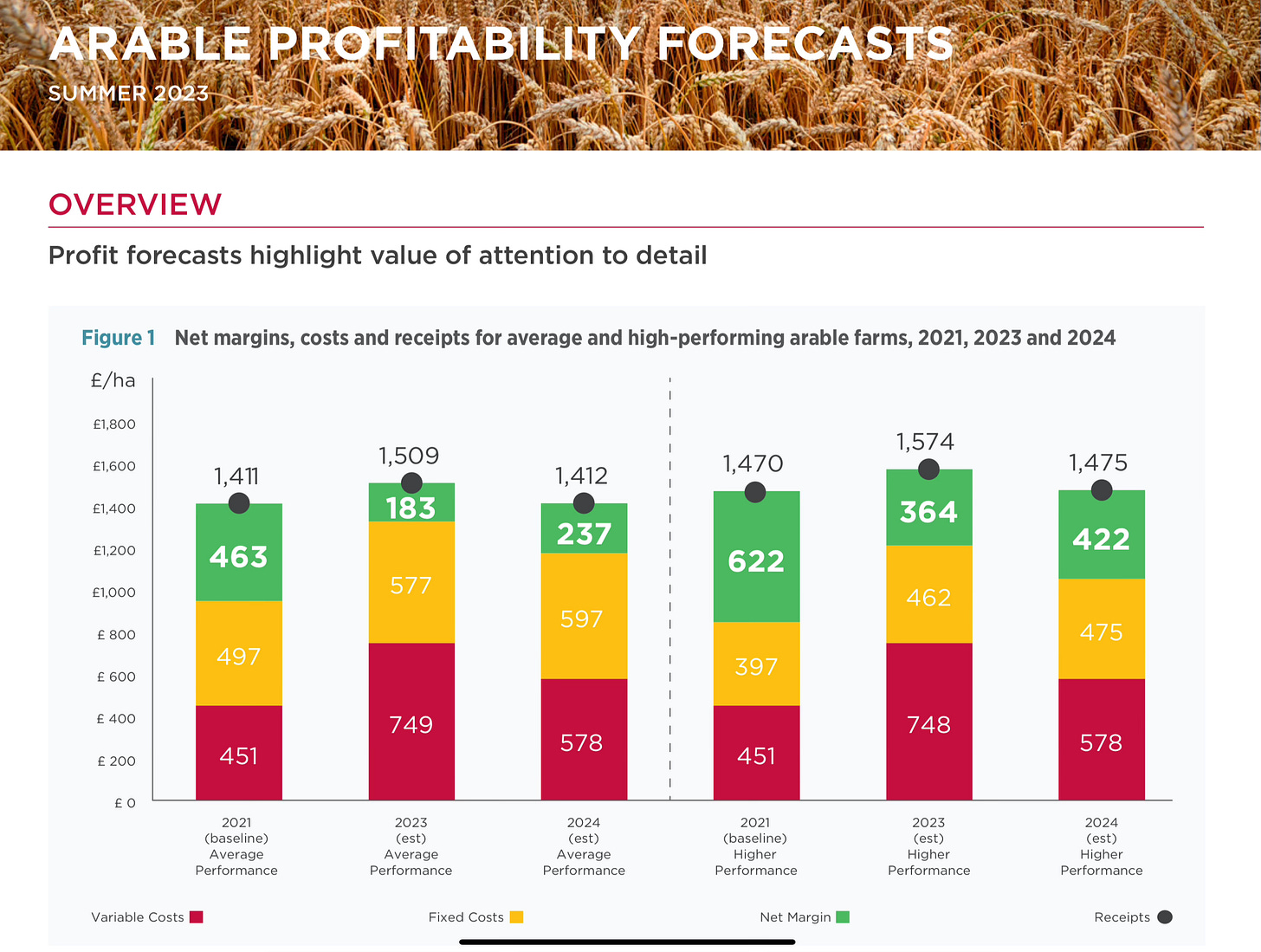

🍀🙌🙏✨🤍💚🧺🖼️✅